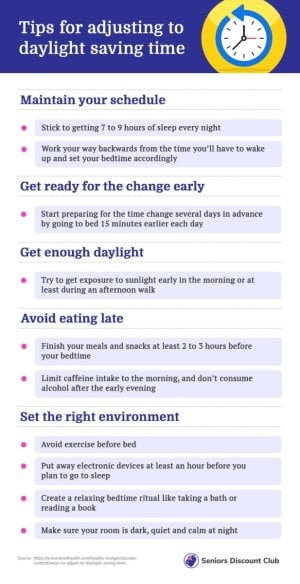Get ready to turn your clocks back because the end of daylight saving is just around the corner!
By
- Replies 19
As the seasons change and cooler weather approaches, Aussies nationwide are adjusting their routines around the upcoming schedule changes.
That’s right - this Sunday, April 2, at 3 am in NSW, VIC, ACT, TAS and SA, clocks go back by one hour, and we revert to Australian Eastern Standard Time (AEST) until the first Sunday of October.
While five of the eight Australian states and territories follow daylight saving, Queensland, Western Australia and the Northern Territory stick to the same time all year.
It’s a complex situation that has seen debate over whether the seasonal time changes are more of a help or a hindrance.

What are the benefits and drawbacks of daylight saving?
Prior to 1916, Tasmania was the first Australian state to adopt daylight saving. Since then, the issue has been trialled, reintroduced, removed and debated in different states across the country.
Those who are in support of daylight saving point to the potential educational, medical and economic advantages, plus the extra hour of daylight to enjoy after work.
However, there are plenty of opponents to this system. They cite various issues, from increased air conditioner use due to the hotter day times to the difficulty for farmers who need to rise before dawn to complete their shifts.
Back in October of 2019, Robbie Katter, the MP for the North Queensland electorate of Traeger, made it clear that he was not a fan of daylight saving.
In fact, he went so far as to say that implementing it would be a nightmare for those working in the region.
With temperatures often soaring above 40°C, adding an extra hour of work at the end of the day would be an ‘enormous burden’ on the liveability of the area.
'It’s hard enough already to entice people to live in remote areas of Queensland to fill roles in even our primary services,' he remarked.
Impacts of daylight saving on your sleep
Did you know that daylight saving can mess with your sleep? It turns out that changing our clocks by an hour can have a negative impact on our body clocks and circadian rhythms.
Professor Sean Cain, President of the Australasian Chronobiology Society, has spent years studying the effects of ‘circadian rhythms’ — the 24-hour day cycle to which our bodies, brains, and behaviours are accustomed — on our well-being.
He explains that our bodies are naturally programmed to function best on bright days and dark nights, and daylight saving can throw that balance off.
When we lose sleep due to the time change, it's like giving ourselves a case of jet lag.
That's why Cain and other researchers strongly oppose daylight saving, arguing that the benefits of living in standard time outweigh the advantages of switching back and forth.
He explained: ‘It is quite disruptive, and it leads to more accidents, trips to the emergency room for heart attacks, things like that.’
‘We can say that this is 7 o’clock, or that’s 7 o’clock, but our bodies don’t care. They try to follow the solar day.’
According to Cain, people who don't live in regions that follow daylight saving tend to live longer, be healthier, and be more productive.
While some may argue that the longer days and extra leisure time in summer are worth the health risks, Cain says they don't understand the science behind it all.

So, for our members who live in states where daylight saving is ending, why not take advantage of those cosy evenings and enjoy a little more rest? Don't forget to turn your clocks back and get ready to welcome the cooler months!
Also, we want to hear from you: Are you in favour or against daylight saving? Share your thoughts in the comment section below!
Note: A previous iteration incorrectly referred to 'daylight saving time' as 'daylight savings time'. This has now been corrected.
That’s right - this Sunday, April 2, at 3 am in NSW, VIC, ACT, TAS and SA, clocks go back by one hour, and we revert to Australian Eastern Standard Time (AEST) until the first Sunday of October.
While five of the eight Australian states and territories follow daylight saving, Queensland, Western Australia and the Northern Territory stick to the same time all year.
It’s a complex situation that has seen debate over whether the seasonal time changes are more of a help or a hindrance.

Many Australians are preparing to adjust their watches and clocks for the upcoming end of daylight saving. Credit: Pexels/Karolina Grabowska.
What are the benefits and drawbacks of daylight saving?
Prior to 1916, Tasmania was the first Australian state to adopt daylight saving. Since then, the issue has been trialled, reintroduced, removed and debated in different states across the country.
Those who are in support of daylight saving point to the potential educational, medical and economic advantages, plus the extra hour of daylight to enjoy after work.
However, there are plenty of opponents to this system. They cite various issues, from increased air conditioner use due to the hotter day times to the difficulty for farmers who need to rise before dawn to complete their shifts.
Back in October of 2019, Robbie Katter, the MP for the North Queensland electorate of Traeger, made it clear that he was not a fan of daylight saving.
In fact, he went so far as to say that implementing it would be a nightmare for those working in the region.
With temperatures often soaring above 40°C, adding an extra hour of work at the end of the day would be an ‘enormous burden’ on the liveability of the area.
'It’s hard enough already to entice people to live in remote areas of Queensland to fill roles in even our primary services,' he remarked.
Impacts of daylight saving on your sleep
Did you know that daylight saving can mess with your sleep? It turns out that changing our clocks by an hour can have a negative impact on our body clocks and circadian rhythms.
Professor Sean Cain, President of the Australasian Chronobiology Society, has spent years studying the effects of ‘circadian rhythms’ — the 24-hour day cycle to which our bodies, brains, and behaviours are accustomed — on our well-being.
He explains that our bodies are naturally programmed to function best on bright days and dark nights, and daylight saving can throw that balance off.
When we lose sleep due to the time change, it's like giving ourselves a case of jet lag.
That's why Cain and other researchers strongly oppose daylight saving, arguing that the benefits of living in standard time outweigh the advantages of switching back and forth.
He explained: ‘It is quite disruptive, and it leads to more accidents, trips to the emergency room for heart attacks, things like that.’
‘We can say that this is 7 o’clock, or that’s 7 o’clock, but our bodies don’t care. They try to follow the solar day.’
According to Cain, people who don't live in regions that follow daylight saving tend to live longer, be healthier, and be more productive.
While some may argue that the longer days and extra leisure time in summer are worth the health risks, Cain says they don't understand the science behind it all.
Key Takeaways
- Daylight saving is ending on April 2 for NSW, VIC, ACT, TAS, and SA, as clocks go back one hour.
- The debate over daylight saving's benefits and drawbacks, including educational, medical, and economic advantages, versus increased air conditioner use and difficulties for farmers, continues to rage.
- Professor Sean Cain, President of the Australasian Chronobiology Society, has conducted research showing that daylight saving can negatively impact sleep, circadian rhythms, and overall well-being.
- According to Cain, people who live in regions without daylight saving tend to live longer, be healthier, and be more productive.
So, for our members who live in states where daylight saving is ending, why not take advantage of those cosy evenings and enjoy a little more rest? Don't forget to turn your clocks back and get ready to welcome the cooler months!
Also, we want to hear from you: Are you in favour or against daylight saving? Share your thoughts in the comment section below!
Note: A previous iteration incorrectly referred to 'daylight saving time' as 'daylight savings time'. This has now been corrected.
Last edited by a moderator:









